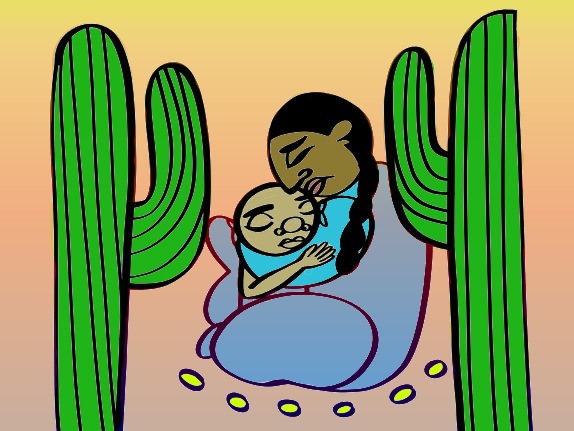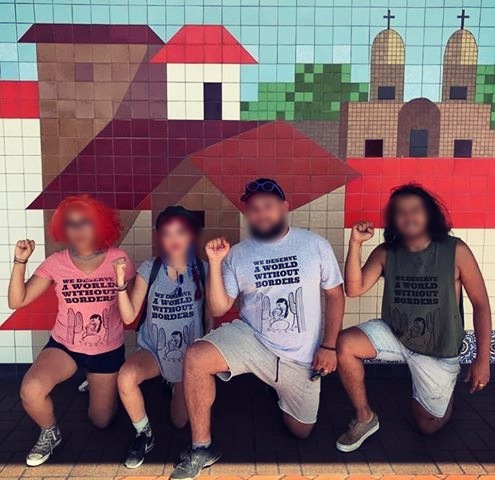
In the rush to celebrate the new found diversity of the recently elected Congress, we may miss the larger picture and purpose of structures of power in the U.S. Ella Mendoza is an undocumented organizer based in Salt Lake City, Utah and the artist behind the accompanying artwork. Follow them on Instagram.
By Ella Mendoza
Watching bisexual senator Kyrsten Sinema get sworn in while placing her hand on a copy of the U.S. Constitution was a sobering moment for me. As one of many undocumented organizers around the country, I’ve spent the past few months focused on establishing support networks with members of the migrant caravan, fundraising for the many migrant families affected by the fast-paced changes in immigration policies, while building momentum with local and national campaigns around #AbolishICE. Throughout the year, I paid little to no attention to the ongoing elections. Why would I? Being undocumented not only means a lack of documentation, it means a lack of humanity under the gaze of anyone in power. It means not having any rights except for when you are the topic of a conversation.
From the very beginning of this political race, I knew none of the smiling faces in suits cared about my existence, and why would they? Sinema getting sworn in with the Constitution instead of a religious text may have been a huzzah moment for atheists worldwide, but to me, it was a reminder that no matter how friendly and feminist this “new system” might become, I was still subject to its laws. Laws that have declared my body illegal, my actions unforgivable. It doesn’t matter how old I was when I crossed the border, or how the actions of this country have had an impact on my homeland, how these very actions started the chain of events that led to me immigrating here. In this world of neoliberal feminism, we worship laws and we follow them.
“The future is brown girls in hoops passing laws that will inherently send other brown girls in hoops to prison.”
“The future is female” seems to mean, “The future is a cisgender, law-abiding woman.” The future is brown girls in hoops passing laws that will inherently send other brown girls in hoops to prison. And while I see the need for representation in many fields, electoral politics is not one of them. By increasing the representation of Black and Brown bodies in office, we are only contributing to the narrative that these changes shift power, when in reality the only shift in power can come from below.
Participating in this system is part of what fuels it— the popular eagerness for validation, the needless fetishization that comes from “climbing the ladder.” Any elected official is an agent of the state, just as every cop is an enforcer of the state’s power. Together, elected officials and the state enforce oppressive and systemic imperialism, establishing a hierarchy that is meant to be impenetrable. By normalizing oppression as an everyday consequence to living in this country, not only is a sense of complacency continued to move forward, we are also encouraged to forgive and forget the system. We are encouraged to trust those in power, relying on the instinct that those who look like us must want what’s best for us.

“We deserve a world without borders,” design by author.
We are encouraged to look for heroes in a country that has killed all of our heroes. The system asks, “Who will save us?” And how convenient that in this narrative, which forgives capitalism for having created the problems that we are now facing— that forgives fascism for its contributions to these dangerous dynamics— the system readily provides smiling faces in suits as the answer. As social media encourages oppressed communities to ask more questions, the answers become catered to an audience that wants a sense of representation as well as a sense of purpose.
The assimilation of marginalized bodies into positions of power will only be used as a distraction from the ongoing violence that this settler-colonial system inflicts upon marginalized bodies everywhere. This must not stop us from moving forward, but remind us of who our true heroes are. As an undocumented queer migrant, a descendant from the Amazons, my heroes are my people: the grandmothers who fought back against the colonizers; the indigenous warriors who continue to fight back when all seems hopeless, who have not won power by campaign or promise, but by the need to fight back, by the legacy of unfathomable strength.
Ella Mendoza is an undocumented activist based in Salt Lake City.

For further and more in depth readings on left strategy, the state, and electoralism we recommend our reader, “Socialist Faces in High Places: Elections & the Left.”
